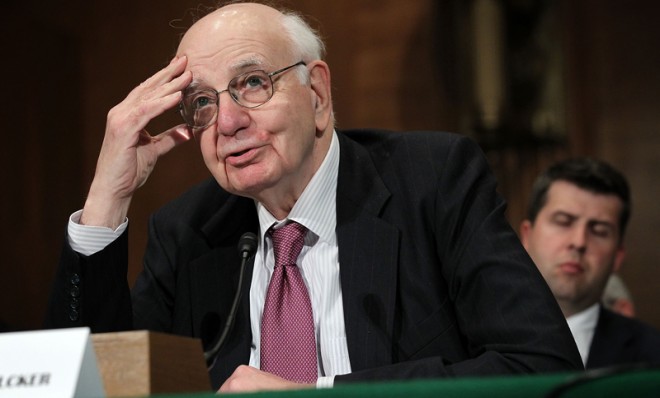A fresh wave of Volcker Rule rage
On the third anniversary of Dodd-Frank, banks are complaining louder than ever

A free daily email with the biggest news stories of the day – and the best features from TheWeek.com
You are now subscribed
Your newsletter sign-up was successful
Yesterday was the third anniversary of the Dodd-Frank Act, a sweeping set of financial regulatory reforms aimed at preventing another global financial catastrophe. But regulators still haven't hammered out an effective version of one of the act's centerpieces: The so-called Volcker Rule.
First proposed by former Fed Chairman Paul Volcker, the provision theoretically puts the kibosh on most proprietary trading, which is when an institution that has access to Federal Reserve funds and insured deposits (i.e. all big banks) invests with its own funds for profit. It also limits the ability of banks to use their own funds in risky activities like derivatives trading.
The idea is to prevent colossal losses that could spark a system-wide panic. Morgan Stanley memorably lost $9 billion during the height of the financial crisis on a derivatives position, and many argue that the $2 billion loss JPMorgan Chase suffered in May 2012 — known as the London Whale incident — would have been prevented had proprietary trading already been banned.
The Week
Escape your echo chamber. Get the facts behind the news, plus analysis from multiple perspectives.

Sign up for The Week's Free Newsletters
From our morning news briefing to a weekly Good News Newsletter, get the best of The Week delivered directly to your inbox.
From our morning news briefing to a weekly Good News Newsletter, get the best of The Week delivered directly to your inbox.
But regulators, who are in charge of figuring out how to implement the legislation's directives, are having a hell of a time smoothing out this particular element of the Dodd-Frank Act. The Volcker Rule was supposed to go into effect July 2012, but the latest version didn't drop until late last year — and when it did, it was riddled with questions posed by stumped regulators.
Meanwhile, banks have stepped up their campaign against the rule, claiming it could bring down the entire industry.
Adding fuel to the debate, Charles W. Calomiris, Professor of Financial Institutions at Colombia Business School, on Monday wrote in The American, "The Volcker Rule is a major threat to banks’ ability to continue acting as market makers (intermediaries that accept orders to buy and sell to maintain liquidity in the trading of particular financial instruments). Proprietary trading cannot be distinguished as an activity from market making. The two activities are not observably different on a transactional basis, but reflect different intent, which is not possible to observe."
If U.S. banks can't continue acting as market makers, warned Calomiris, it could threaten their global dominance.
A free daily email with the biggest news stories of the day – and the best features from TheWeek.com
Unless regulators can find a way to avoid hobbling market making when prohibiting proprietary trading, it could turn out that the only way a global universal bank will be able to operate in Mexico and other countries is to stop operating in the United States — meaning not only ending its physical presence in the United States, but also moving its trading to other capital markets — a prospect that should worry Americans. The global market’s ultimate adjustment to the Volcker Rule may be not only to shift resources to non-U.S. banks, but also to shun New York as a financial center and to move away from the dollar as a reserve currency. [The American]
Calomiris' dire warnings, however, would appear to be belied by the numerous loopholes in which banks can, in fact, engage in proprietary trading. And those loopholes have created a lot of confusion. Here's The Wall Street Journal on one such measure:
A provision in the rule, part of the Dodd-Frank financial overhaul passed in 2010, outlines curbs on bank director and employee participation in bank-run investments. In order for banks to continue investing in these funds, they have to get an exemption that is based on fulfilling certain conditions, one of which is ensuring only certain employees have access to the funds. As regulators finalize the rule, scheduled to take effect a year from now, banks are reaching widely different interpretations of what that employee-participation measure means. [The Wall Street Journal]
The fact that the Volcker Rule is fast becoming a regulatory nightmare has even earned it criticism from liberal economists. "Volcker was a good idea in principle, but the implementation has been dreadful," Simon Johnson, the former head of the IMF, told The Washington Post. "It may make some contribution but will no doubt continue to draw a lot of pushback and gaming by the industry."
Carmel Lobello is the business editor at TheWeek.com. Previously, she was an editor at DeathandTaxesMag.com.
-
 The Week Unwrapped: Do the Freemasons have too much sway in the police force?
The Week Unwrapped: Do the Freemasons have too much sway in the police force?Podcast Plus, what does the growing popularity of prediction markets mean for the future? And why are UK film and TV workers struggling?
-
 Properties of the week: pretty thatched cottages
Properties of the week: pretty thatched cottagesThe Week Recommends Featuring homes in West Sussex, Dorset and Suffolk
-
 The week’s best photos
The week’s best photosIn Pictures An explosive meal, a carnival of joy, and more